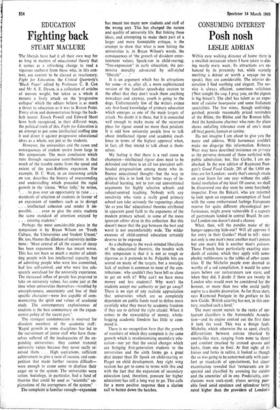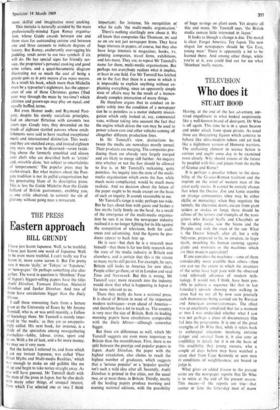Posh nosh
CONSUMING INTEREST LESLIE ADRIAN
Within easy walking distance of home there is a smallish restaurant where I have taken to din- ing nearly every week. Its attractions are en- hanced by its proximity but, while scarcely meriting a detour or worth a voyage (so to speak), they are considerable. The interior de- coration I find soothing and elegant. The ser- vice is always efficient, sometimes solicitous (Not tonight the coq, I pray you, on the pigeon is big breast'). The chef has talent as an expo- nent of cuisine bourgeoise and some Italianate specialities. The few wines, though undisting- guished, provide reasonably priced reminders of the Rhine, the Rhone and the Roman hills. And the handsome charmer who runs the place shows unfailing tolerance even of one's most off-beat guests, human or canine.
Do not imagine I am about to give you the name and address. Wild horsemeat couldn't make me disgorge this information. Rebecca West may have described insistence on privacy as the perverse demand of those surfeited with public admiration; but, like Garbo, I am un- abashed. In the new edition of Raymond Post- gate's Good Food Guide, 281 of the 1,600 en- tries are for London: surely that's enough strain on your livers for one year without the addi- tional revelation of my local. Of course, we shall be discovered one day soon by some busybody inspector. Even the Bakairi, who are reported to look upon an exposed consumption of food with the same embarrassed feelings Europeans reserve for quite different physiological per- formances, might prove vulnerable if a capsule of gastronauts landed in central Brazil. In cen- tral London one doesn't stand a chance.
What, then, will the pundits. make of thy hunger-appeasing hide-out? Will all approve it for entry in their Guides? Hard to tell: since not only is one man's meat another man's poison but one man's fish is another man's poisson. Those French have particularly exacting stan- dards of cuisine, which they apply with xeno- phobic ruthlessness to the tables of other coun- tries. If the Michelin people ever deemed us worthy of a red compilation, it would be some years before our restaurateurs saw stars; and when they did, I doubt if there are twenty in London who would even be considered for the honour, or more than two who could justly aspire to a double decoration. As for three stars, says Raymond Postgate in the „preface to his new Guide, 'British catering has not, in this cen- tury, reached such a level.'
The most recent recruit to the ranks of res- taurant classifiers is the Automobile Associa- tion—and its engine conked out the first time it took tke road. This was a design fault. Michelin, which otherwise the AA aped, clearly differentiates between cuisine (marked by rosette-like stars, ranging from none to three) and comfort (marked by crossed spoons and forks, from one to five). At first sight of its knives and forks in saltire, it looked as though the AA was going to be concerned only with coin- fort or standards of appointment, but closer examination revealed that 'restaurants are in- spected and classified by assessing the cuisine and the amenities' all in one. Predictably, con- clusions were cock-eyed; places serving pass- able food amid opulence and splendour being rated higher than the providers of London's
most skilful and imaginative most cooking.
This mistake is naturally avoided by the more professionally-minded Egon Ronay organisa- tion, whose Guide awards between one and three stars for outstanding cuisine and between one and three coronets to indicate degrees of luxury. But Ronay, exuberantly over-egging his pudding, tends never to use two symbols if six will do. He has special signs for friendly ser- vice, the proprietor's personal cooking and good wine values, and a quasi-barometric diagram illustrating not so much the cost of being a greedy-guts as le prix mayen dun repas moyen. As a result his book, which more than Michelin must be # typesetter's nightmare, has the-appear- ance of one of those Christmas games ('find your way through the maze by tea-time') which children and grown-ups may play on equal, and equally baffled, terms.
But even Homer nods; and Raymond Post- gate, despite his sternly socialistic principles, had an aberrant flirtation with coronets two )ears ago. Galt& toys, they descended on the heads of eighteen startled patrons whose estab- lishments were said to have reached exceptional merit and international distinction. This week- end they are snatched away, and instead eighteen tiny stars may now be discerned—seven twink- ling above the formerly ennobled and eleven over chefs who are described both as 'artists' and, mirabile dictu. 'not subject to uncertainties of temperament.' The popular press may be starlet-struck. But what matters about the Post- gate tradition is not its pallid categorisation but the penetrating blaze of its descriptive prose. This is less the Guide Michelin than the Guide Julliard of British gastronomy, enabling you, as one critic observed, to commit the sin of gluttony without going near a restaurant.



































 Previous page
Previous page